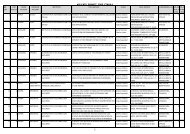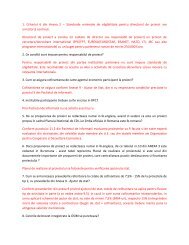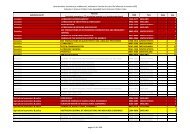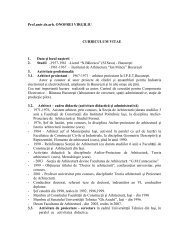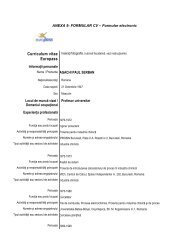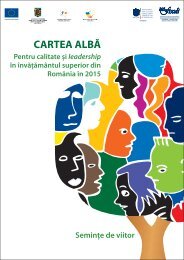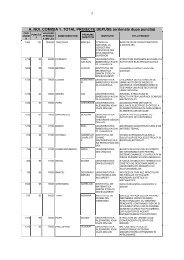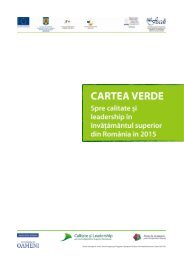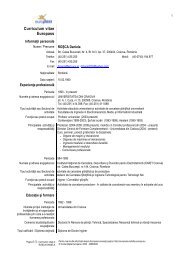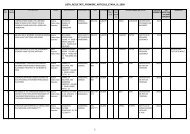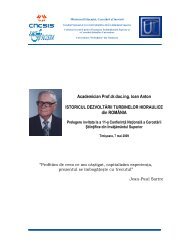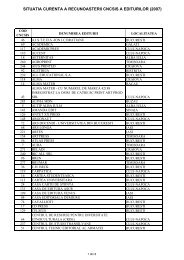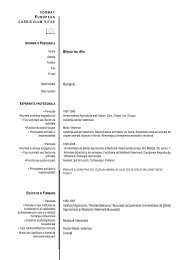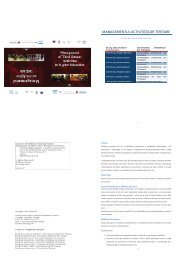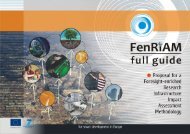Modul de formare-Managementul resurselor financiare - uefiscdi
Modul de formare-Managementul resurselor financiare - uefiscdi
Modul de formare-Managementul resurselor financiare - uefiscdi
- No tags were found...
Create successful ePaper yourself
Turn your PDF publications into a flip-book with our unique Google optimized e-Paper software.
In Romania the higher education funding is ma<strong>de</strong> on the principle "the resources follow the<br />
stu<strong>de</strong>nts”. The concept of "equivalent stu<strong>de</strong>nt" is used to create a certain homogeneity between<br />
the various areas and durations of the higher education.<br />
The quality indicators are a component with a stimulating and corrective role. It allows that state<br />
budget allocations meet the basic needs of the universities to prepare stu<strong>de</strong>nts (staff costs and<br />
material costs) to be correlated on how these needs are met from funds allocated by the state and<br />
other income.<br />
In the expenses structure those with wages (teaching and non-teaching staff) have a significant<br />
proportion, statistically, covering about 80% of the total allocations received by the core<br />
funding of universities. The expenses on staff wages in the higher education system varies<br />
<strong>de</strong>pending on the teaching positions structure and their occupancy rate. The teaching staff wages<br />
are directly affected by the number of teaching hours per stu<strong>de</strong>nt, and by the number of<br />
equivalent stu<strong>de</strong>nts corresponding to a teaching position.<br />
The additional funding of the higher education institutions is carried out based on an<br />
additional contract conclu<strong>de</strong>d with the Ministry of Education, Research,Youth and Sports, for<br />
each additional funding granted.The additional funding is ma<strong>de</strong> both from the state budget and<br />
from external sources, ie loans and foreign aids.<br />
1.5. Some strategic proposals on the financing of the universities in Romania at this stage<br />
The international experience and the practice at the national level recommends us a new focus<br />
in terms of the higher education financing strategy in Romania.<br />
First, financing an university has to take into account its specific activity:<br />
only the educational activities;<br />
education and research activities;<br />
only research activities.<br />
This calls for the universities to be licensed for one of these activities. Currently there is a<br />
mixture between teaching and research activity that often creates confusion.<br />
Second, it may be better that the universities to <strong>de</strong>fine their teaching activities on cycles:<br />
only cycle I, licensing;<br />
only cycle II and III, i.e. masters and PhD School;<br />
all three cycles.<br />
In this context, as result of the institutional evaluations, the universities should be classified on<br />
the basis of their competences regarding teaching and research activities.<br />
Third, there are at least three main funding sources:<br />
from the state budget;<br />
from the school fees;<br />
from the bank loans for studies.<br />
1. As regarding the budgetary financing, it should be ma<strong>de</strong> a major reconsi<strong>de</strong>ration of this<br />
system: the state should allocate at national level, on areas (engineering, economics, medicine,<br />
etc.) a number of places for the public fun<strong>de</strong>d stu<strong>de</strong>nts correlated with the needs of the public<br />
sector. As such, the state should finance the future specialists of the institutions and public<br />
organizations. Procedural, as result of the or<strong>de</strong>rs received from the public institutions, the state<br />
finances annually, through an organized national competition, a number of positions. The<br />
winners of funding vouchers must be free to choose, by registering and signing a contract for<br />
studies, the university where he/she wishes to study. The funding has to cover the complete<br />
cycle of study, in terms of the accountability of the stu<strong>de</strong>nt on the quality of his/her training. For<br />
example, if he does not get a certain score or does not graduate he have to return the the<br />
ammount of funds used. On the another hand, the state must assure him the conditions to obtain<br />
14



